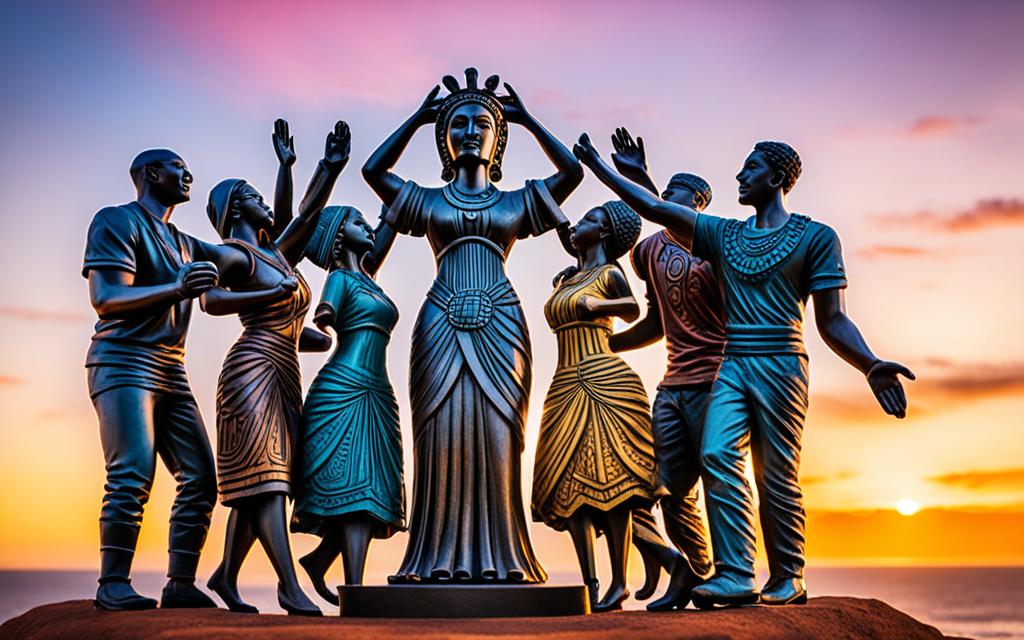Preserving History: Significance of African Heritage
March 5, 2024 | by mediaforafrica.net

Welcome to our exploration of the significance of cultural heritage sites in Africa and the importance of historical preservation. Have you ever wondered why African heritage sites hold such immense value? What is it about these sites that make them essential for the preservation of African heritage and culture? Let’s delve into the rich tapestry of African history and uncover the answers together.
Throughout the vast continent of Africa, there are numerous cultural heritage sites that stand as testament to the rich and diverse history of its people. These sites range from ancient ruins and archaeological wonders to sacred landscapes and historical landmarks.
Each site carries a unique story, a story that reflects the struggles, triumphs, and contributions of African civilizations over thousands of years. They serve as a window into the past, allowing us to understand our collective human journey and the cultural legacies that have shaped our world.
Preserving these heritage sites is crucial to ensure that future generations can connect with their African roots and appreciate the extraordinary cultural heritage that Africa possesses. By safeguarding these sites, we not only honor the past but also provide a foundation for the future.
Key Takeaways:
- African cultural heritage sites hold immense value in preserving African heritage and culture.
- These sites reflect the rich and diverse history of Africa and its people.
- Preservation efforts are necessary to ensure future generations can connect with their African roots.
- By protecting these sites, we honor the past and provide a foundation for the future.
- The exploration of cultural heritage sites in Africa is a journey of discovery and appreciation for our collective human history.
Reflecting the Rich Tapestry of Africa’s Cultural Legacy
When it comes to preserving African culture and heritage, the significance of African historical landmarks cannot be overstated. These sites serve as tangible remnants of the continent’s past, reflecting the rich tapestry of Africa’s cultural legacy. From majestic pyramids to ancient ruins and vibrant tribal villages, these landmarks provide a window into the diverse history and traditions of the African people.
Preserving African culture is not merely an act of historical conservation; it is an essential endeavor that connects the present generation with their roots and identity. These cultural heritage sites hold immense value in terms of historical, cultural, and anthropological significance. They offer insights into ancient civilizations, traditional practices, and artistic expressions that have shaped Africa’s unique cultural tapestry.
“A cultural heritage site is a treasure trove of stories, memories, and knowledge passed down from generations. It is our responsibility to protect and cherish these sites for the sake of preserving African culture.”
By preserving and safeguarding African historical landmarks, we ensure that future generations can continue to appreciate and learn from the rich heritage that defines Africa. These sites act as living classrooms, offering a tangible experience that textbooks and documentaries cannot replicate.
Moreover, cultural heritage sites in Africa contribute to the continent’s tourism industry, attracting visitors from all over the world. These landmarks serve as magnets that draw people to experience firsthand the wonders of African culture and history. Tourism, in turn, plays a vital role in economic development and sustainability, creating opportunities for local communities and promoting cross-cultural exchange.
Explore a glimpse of Africa’s cultural legacy through the following image:
Cultural Heritage Preservation: Efforts and Conservation in Africa
In our ongoing exploration of cultural heritage in Africa, we now turn our attention to the dedicated efforts and conservation initiatives aimed at preserving and safeguarding African heritage sites. These sites hold immense historical and cultural significance, serving as tangible links to the past and repositories of invaluable knowledge.
Understanding the significance of heritage sites is crucial in comprehending why their preservation is of paramount importance. African heritage sites bear witness to the diverse and rich history of the continent, encompassing ancient civilizations, indigenous traditions, and colonial legacies. They are not only emblematic of Africa’s profound cultural heritage but also serve as beacons of resilience and collective memory.
Historical preservation efforts in Africa have taken various forms, from government-led conservation projects to the involvement of international organizations and local communities. Recognizing the importance of preserving tangible and intangible heritage, significant strides have been made to ensure the protection and sustainable management of these sites.
The Significance of African Heritage Sites
Cultural heritage preservation in Africa is not only about safeguarding physical structures and artifacts but also about honoring the collective memory, traditions, and knowledge they represent. By preserving these sites, we can pass down the wisdom of our ancestors to future generations and foster a deeper understanding and appreciation of our heritage.
“A heritage site is like a portal that connects us to the past, allowing us to walk in the footsteps of those who came before us and providing invaluable insights into our shared history.”
The conservation efforts extend beyond mere physical restoration; they encompass promoting sustainable tourism, educational programs, and community engagement projects. These initiatives aim to strike a delicate balance between preserving the integrity of the sites and ensuring their accessibility to the public, enabling everyone to experience and appreciate Africa’s cultural legacy.
Conservation Strategies and Initiatives
The preservation and conservation of African heritage sites are complex endeavors that require a multifaceted approach. Governments, organizations, and communities collaborate to implement strategies that address various challenges, such as climate change, urbanization, looting, and inadequate resources.
Some key conservation strategies and initiatives include:
- Implementing strict legal frameworks and regulations to protect heritage sites.
- Investing in research and documentation to deepen our understanding of these sites.
- Engaging local communities in the conservation process, fostering a sense of ownership and pride.
- Raising awareness about the value of cultural heritage through educational programs and campaigns.
Together, these efforts contribute to the sustainable preservation of African heritage sites, ensuring their longevity for future generations to cherish and embrace.
By working collaboratively and recognizing the importance of cultural heritage preservation, we can safeguard Africa’s diverse and remarkable heritage sites. These sites not only connect us to our past but also shape our collective identity in the present and inspire us to envision a better future.

Conclusion
In conclusion, the preservation of African heritage sites plays a crucial role in safeguarding the rich history and cultural diversity of the continent. These sites serve as tangible and intangible treasures that connect us to our past, enabling us to understand and appreciate our shared African identity.
Through cultural conservation in Africa, we can ensure that future generations have the opportunity to explore and learn from these historical landmarks. By protecting and maintaining African heritage sites, we create spaces for dialogue, education, and cultural exchange, fostering a deeper understanding and appreciation of our collective heritage.
Preserving history through African heritage sites is not just about remembering the past – it is about celebrating the contributions and resilience of generations before us. It is a testament to the creativity, ingenuity, and strength of African cultures and peoples, showcasing their profound impact on the world.
As we move forward, let us continue to prioritize and invest in the cultural conservation of Africa. By doing so, we not only honor our past but also build a foundation for a vibrant and diverse future, where cultural heritage sites serve as living testimonies to the beauty and richness of African heritage.
FAQ
What is the significance of cultural heritage sites in Africa?
Why are African heritage sites important for historical preservation?
How do cultural heritage sites contribute to preserving African culture?
What is the significance of African historical landmarks?
How do efforts for cultural heritage preservation take place in Africa?
Why is the heritage site significance important in Africa?
What are some of the notable African heritage sites?
How can we contribute to cultural conservation in Africa?
RELATED POSTS
View all


